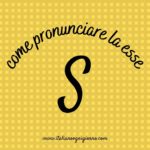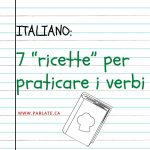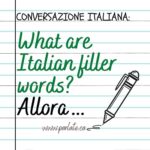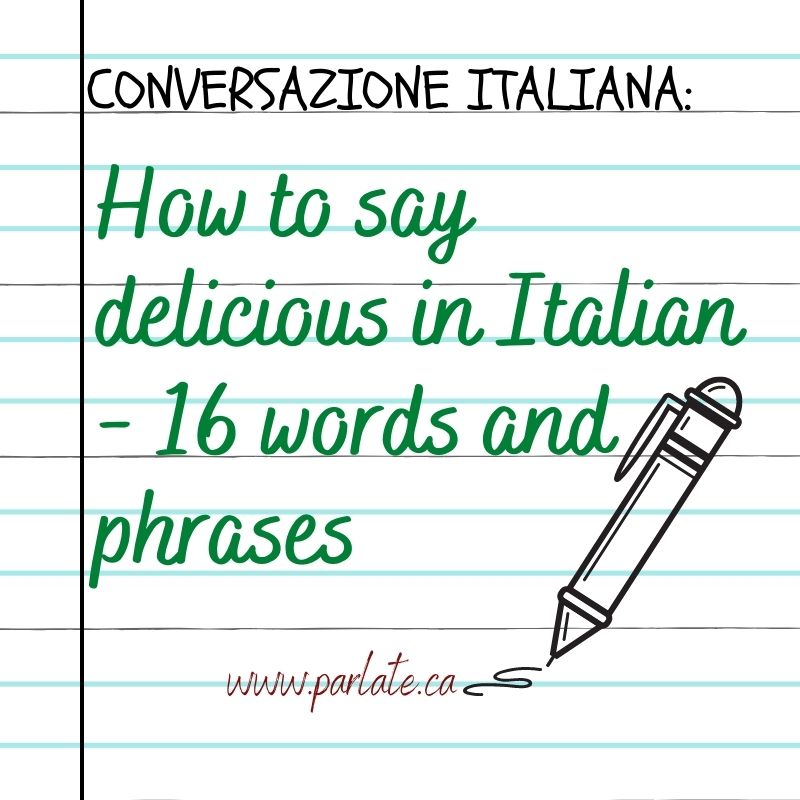Sai, che il proverbio “De gustibus non disputandum est” – Sui gusti non si discute, è uno dei più utilizzati dagli italiani? E comunque non viene utilizzato solo riguardo al cibo, bensi anche per ogni altro tipo di gusto: musica, moda, genere letterario ecc.
Nell’articolo di questa settimana però restiamo nel campo del cibo e vediamo tutti i modi per dire “buonissimo” in italiano.
Le parole e le espressioni non mancano, come puoi immaginare! Parlare di buon cibo a livello gustativo e olfattivo fa parte dell’italianità!
RICORDA: gli aggettivi si concordano con il genere e numero del sostantivo. Per esempio:
Buono – maschile singolare
Buona – femminile singolare
Buoni – maschile plurale
Buone – femminile plurale
Do you know that the proverb “De gustibus non disputandum est”/ Sui gusti non si discute (there’s no accounting for taste) is one of the most used by Italians? And in any case it is not only used for food, but also for any other type of taste: music, fashion, literary genre, etc.
In this week’s article, however, we remain in the field of food and look intl all the ways to say “very good” in Italian.
There is no shortage of words and expressions, as you can imagine! Speaking of good food on a gustatory and olfactory level is part of being Italian!
REMEMBER: adjectives agree with the gender and number of the noun. For instance:
Buono – masculine singular
Buona – feminine singular
Buoni – masculine plural
Buone – feminine plural
Buonissimo / very good
Buono diventa un superlativo assoluto “buonissimo” quando dire buono proprio non basta!
Good becomes an absolute superlative “Buonissimo”/ “very good” when saying “buono” is just not enough!
- E’ buonissima questa pasta al pesto! – This pasta al pesto is very good!
Delizioso / delicious
Ecco una espressione che ha non solo il significato di “buonissimo”, ma pochi stranieri sanno che si può usare in altri contesti con il significato di carino, simpatico. Riferendosi per esempio a “una persona deliziosa” o a “un regalo delizioso”.
Here is an expression that not only has the meaning of “very good”, but few foreigners know that it can be used in other contexts with the meaning of delightful, charming. Referring for example to “a charming person” or “a delightful gift”.
- Tutte le pizze del ristorante erano deliziose. – All the pizzas at the restaurant were delicious!
- Abbiamo conosciuto una deliziosa famiglia siciliana. – We met a charming Sicilian family.
Che delizia / what a delight
In questo caso però la parola “delizia”, il sostantivo de cui deriva l’aggettivo delizioso, si riferisce solo al cibo.
In this case, however, the word “delizia”, the noun from which the adjective “delizioso” derives from, refers only to food.
- Che delizia questo rustico agli spinaci! – What a delight this spinach savory cake is!
Che buono / so good
Questa è sicuramente l’esclamazione più popolare: “Che buono” o semplicemente, “buono! A volte si tende ad allungare il suono della “o” alla fine in conseguenza al gusto della pietanza particolarmente apprezzata!
This is surely the most popular exclamation: “Che buono”/”So good” or simply, “Buono”/ “good! Sometimes there is a tendency to lengthen the sound of the “o” at the end as a result of the taste of the dish which is particularly appreciated!
- Che buoni questi biscotti appena sfornati! – These freshly baked cookies are so good!
Squisito / Exquisite
Come alternativa a “buonissimo” puoi anche dire “Squisito”.
As an alternative to “buonissimo” you can also say “Squisito” / Exquisite”.
- La cena che hai preparato era squisita. – The dinner you cooked was exquisite.
Che bontà / So good
Se non vuoi ripeterti tropp dicendo “che buono” , prova invece a dire “Che bontà”/so good.
If you don’t want to repeat yourself too many times saying “che buono”, try saying instead “Che bontà” / “so good”.
- Ma che bontà queste albicocche del tuo giardino. / These apricots from your garden are so good.
Che prelibatezza / What a delicacy
Dalla parola prelibato, nasce l’espressione “Che prelibatezza” / “What a delicacy”.
From the word “prelibato”/”delicious”, comes the expression”Che prelibatezza” / “What a delicacy”.
- Che prelibatezza questa zuppa di legumi! / What a delicacy this legume soup!
Ottimo / Really good
Tra “buono” e “squisito” troviamo “Ottimo” / “Really good”
Between “buono” and “squisito” we find “Ottimo” / “Really good”.
- Ottima la conserva di pomodoro di quest’anno! – This year’s tomato preserve is really good!
Eccellente / Excellent
Forse meno usata rispetto alle altre parole, ma “Eccellente” / “Excellent” ha il di sicuro il suo posto a tavola!
Perhaps less used than the other words, but “Eccellente” / “Excellent” certainly has its place at the table!
- Abbiamo gustato un eccellente vino d’annata. / We tasted an excellent vintage wine.
Spettacolare / Spectacular
Se vuoi fare un complimento esagerato…
If you want to give an exaggerated compliment …
- Questo risotto è più che buono. È spettacolare! – This pizza is more than good. It’s spectacular!
Gustoso – Saporito / Full of flavor-Tasty
Per dire che una cosa è ricca di sapore, si usano gli aggettivi “gustoso”/”saporito”, “tasty.
To say that something is rich in flavor, the adjectives “gustoso”/”saporito”, “tasty” are used.
- I crostini dell’antipasto erano gustosi. / The crostini on the appetizer were tasty.
Invitante – allettante / tempting – inviting
Queste due parole si possono applicare al cibo, ma anche ad altre cose che ci tentano.
These two words can be applied to food, but also to other things that tempt us.
- Il profumo del forno è molto invitante. / The smell of the bakery is very inviting.
Uno tira l’altro / moreish
A chi non capita di non riuscire a smettere di mangiare una cosa troppo buona!
Who doesn’t find themselves be unable to stop eating something that is too good!
- Questi cioccolatini sono talmente buoni che uno tira l’altro! / These chocolates are so good that they are moreish!
Fa venire l’acquolina in bocca / It is mouth-watering
Un odore invitante o la vista di una cosa buonissima da mangiare “Fa venire l’acquolina in bocca” / “Is mouth-watering”.
- Il profumo delle lasagne fa venire l’acquolina in bocca. / The smell of the lasagna is mouth-watering.
- Non formali / non-formal:
Da leccarsi i baffi / It is mouth-watering
- Gli spaghetti alle melanzane sono da leccarsi i baffi! / The spaghetti with eggplant are mouth-watering!
È buono: da morire – da urlo – impazzire /
It’s to die for – It’s crazy good
- Ti assicuro che gli arancini sono da urlo! / I assure you that the arancini are to die for!
È da sbavo / It’s To drool for
Un’espressione non proprio adatta ad eventi formali ed eleganti! È sicuramente molto più usato tra i più giovani.
An expression not really suitable for formal and elegant events! It is certainly much more commonly used among the younger ones.
- Ho mangiato un pasticcino alla crema da sbavo! I ate a cream pastry to drool for!
Fammi sapere nei commenti quale parole o espressione usi o userai!
Let me know in the comments which words or expressions you use or will use!
- 10 idee per studiare italiano in estate o in vacanza

- 3 ways to pronounce the s in Italian

- 5 Italian listening activities | 5 attività per l’ascolto e la pronuncia

- 7 “ricette” per praticare i verbi

- 7 Italian phrases about freedom | 7 frasi italiane sulla libertà

- Allora, Cioè, Insomma: Italian filler words | parole riempitive – intercalari

- Celebriamo il sommo poeta- 2021 l’anno di Dante

- Come diventare migliori comunicatori in italiano

- Don’t make these 8 Italian word mistakes



Grazie Mirella
Prego Lyne 🙂
Since I have a food blog I use most of the phrases but will sprinkle my newsletters with new ones. Yes. I do get tired of saying, squisito, delizioso, fa venire l’acquolina in boca, gustoso. Most of my subscribers are English speaking but like to know a few Italian words here and there. Thank you for giving me “food” for thought.
Ciao Marisa,
I’m glad I could add a few to your repertorio!
“E’ spettacolare” is very common in Tuscany.
A presto!
Mirella